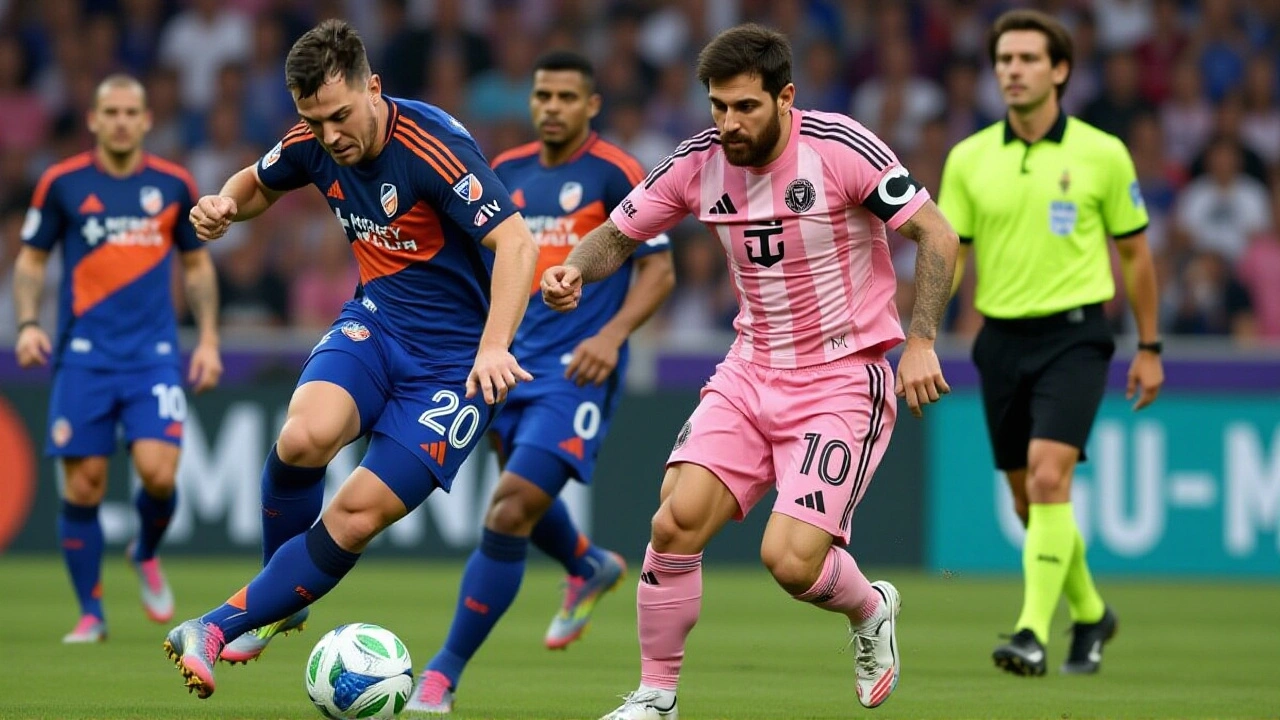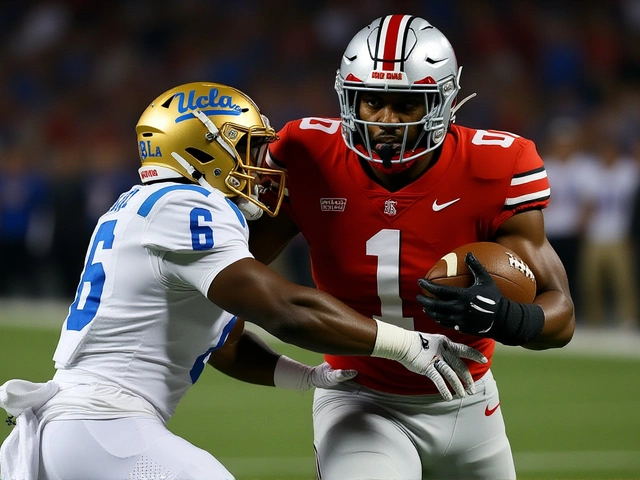On a chilly November evening in Cincinnati, Lionel Messi didn’t just play soccer—he rewrote history. The 38-year-old Argentine legend scored one goal and added three assists as Inter Miami CF crushed FC Cincinnati 4-0 at TQL Stadium on Sunday, November 23, 2025, advancing to the Eastern Conference finals of the Audi 2025 MLS Cup PlayoffsCincinnati, Ohio for the first time in club history. It wasn’t just a win. It was a statement. And it came with a record: Messi now has 12 total goal contributions (six goals, six assists) in this year’s playoffs—the most in MLS postseason history.
A Night Built on Precision
It began in the 19th minute. Jordi Alba carved through midfield, drew two defenders, and slipped a pass to Messi. The ball bounced once, then found Mateo Silvetti, the 21-year-old Argentine winger, sprinting into the box. Silvetti’s low cross was perfect. Messi, unmarked, rose like a man twice his age and headed it past Roman Celentano, Cincinnati’s goalkeeper. The stadium fell silent. Then, the Inter Miami bench exploded.Nine minutes later, Messi had another chance—alone with Celentano—but his left-footed curler kissed the far post and bounced wide. Fans held their breath. But this wasn’t about one moment. It was about rhythm. By halftime, Miami had already controlled 62% of possession and fired five shots on target. Cincinnati, the 2024 Supporters Shield winners and 2025’s second-ranked team, looked rattled.
The Floodgates Open
The second half wasn’t a comeback. It was a coronation.In the 55th minute, Silvetti—this time unassisted by Messi—cut inside from the left, feinted past two defenders, and fired a low shot into the bottom right corner. 2-0. Then, at 62’, Messi threaded a needle: a through ball that split Cincinnati’s backline, finding Tadeo Allende, who buried it past Celentano. By the 74th minute, Allende had completed his brace, finishing off a slick counterattack with a calm finish. Four goals. Zero response from Cincinnati.
Inter Miami had seven shots on target. Cincinnati had four—and none were truly dangerous. Their best chance? A 35th-minute header from Ender Echenique that found Evander da Silva Ferreira, whose shot sailed over the bar. That was it.
Why This Matters
This wasn’t just about Messi. It was about what he’s done since arriving in MLS in 2023. Nine goals in seven games. Twelve playoff contributions. The kind of numbers that make skeptics rethink everything they thought about aging stars in American soccer. He’s not just playing—he’s elevating the entire league’s profile. The Athletic called it “the most dominant individual performance in MLS playoff history.” ESPN noted that “Messi’s influence extends beyond stats—he makes everyone around him better.”For Inter Miami, this is historic. Founded in 2018, the club had never reached the conference final. Now, they’re one win away from the MLS Cup final. And they’ve done it with a 38-year-old legend carrying the load.
For Cincinnati? A brutal end to what was otherwise a stellar season. They won the Supporters Shield in 2024. They finished second in 2025. They beat Columbus Crew in a tense semifinal series just two weeks prior. But against Messi’s Inter Miami, they looked outclassed. Their season ended not with a bang, but with a whimper—four unanswered goals, and a sense of missed opportunity.

What’s Next
Inter Miami will face the winner of the other Eastern Conference semifinal: Philadelphia Union or New York City FC. That match was scheduled for the same day—November 23—but concluded hours before Miami’s win. The final will be held at a yet-to-be-announced venue, likely in the Northeast, with the MLS Cup final set for early December.What’s clear? The league’s narrative has shifted. This isn’t just Messi’s team anymore. It’s the team that can win on the road, in hostile environments, against top-tier opponents. And with him playing like he’s 28, not 38, anything feels possible.
Behind the Numbers
- Messi’s 12 playoff goal contributions (6 goals, 6 assists) are the most in MLS history.- He’s scored in 9 of his last 7 games, including 11 goals total in that span.
- Inter Miami had 7 shots on target vs. Cincinnati’s 4.
- Cincinnati, despite finishing 2nd in the 2025 regular season, lost both meetings with Miami this year (0-3 at home in July, 0-0 away).
- Silvetti and Allende, both under 25, each scored twice in the game—signaling Miami’s depth beyond Messi.
Frequently Asked Questions
How does Messi’s performance compare to other MLS playoff legends?
Messi’s 12 goal contributions in the 2025 playoffs surpass the previous record of 10, set by Diego Valeri in 2015. No player in MLS history has ever recorded six goals and six assists in a single postseason. Even legendary figures like Zlatan Ibrahimović and Carlos Vela never reached double-digit contributions in one playoff run. Messi’s efficiency—averaging 1.7 goal contributions per game—is unmatched.
Why did FC Cincinnati struggle so badly despite their strong regular season?
Cincinnati’s defense, which allowed just 37 goals in 34 regular-season games, was unprepared for Messi’s movement and vision. They relied on structured pressing, but Inter Miami’s quick transitions and Silvetti’s pace exposed gaps. Plus, Cincinnati’s midfield lacked the technical quality to control possession against Miami’s high press. Their loss wasn’t an anomaly—it was a mismatch in elite execution.
What does this mean for Inter Miami’s chances in the MLS Cup final?
Inter Miami now has momentum, depth, and a player who performs under pressure like no other. Their defense has improved significantly since midseason, and Allende and Silvetti have emerged as reliable scorers. If they face Philadelphia—known for its disciplined midfield—they’ll need to maintain their tempo. But with Messi orchestrating, they’re no longer underdogs. They’re favorites.
Is this the peak of Messi’s MLS career?
At 38, it’s hard to say. But this performance suggests he’s still improving in MLS. Unlike his final years in Europe, where he dealt with injuries and reduced minutes, here he’s playing 90 minutes regularly, with tactical freedom. If he stays healthy and the team builds around him, he could reach the MLS Cup final—and possibly win it—before retiring. This isn’t a farewell tour. It’s a second act.
How has Messi changed the perception of MLS globally?
Messi’s presence has drawn unprecedented global attention: MLS viewership rose 42% in international markets during the 2025 playoffs. Broadcasters in 150 countries now carry MLS games live. Sponsors like Adidas and Coca-Cola have increased their investments. For the first time, top European clubs are scouting MLS academies seriously. Messi didn’t just join MLS—he elevated it from a curiosity to a legitimate global league.
What’s the significance of Silvetti and Allende’s performances?
Their two goals each show that Inter Miami isn’t just a one-man show. Silvetti, a 21-year-old from Argentina, has become Messi’s natural partner on the left flank. Allende, 23, has matured into a clinical finisher. Their emergence means Miami can still attack effectively even if Messi is marked or rested. This depth is what separates them from past MLS teams that relied too heavily on a single star.





Tulis komentar